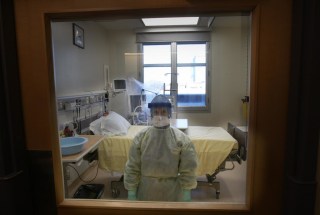Pandemic reveals personal care home risks
Read this article for free:
or
Already have an account? Log in here »
To continue reading, please subscribe:
Monthly Digital Subscription
$19 $0 for the first 4 weeks*
- Enjoy unlimited reading on winnipegfreepress.com
- Read the E-Edition, our digital replica newspaper
- Access News Break, our award-winning app
- Play interactive puzzles
*No charge for 4 weeks then billed as $19 every four weeks (new subscribers and qualified returning subscribers only). Cancel anytime.
Read unlimited articles for free today:
or
Already have an account? Log in here »
Hey there, time traveller!
This article was published 12/04/2020 (1621 days ago), so information in it may no longer be current.
The current coronavirus epidemic has been shining a harsh spotlight on personal care homes in Canada and abroad. Staff and residents in Manitoba’s personal care homes have fared well so far, but disasters in Vancouver, in Bobcaygeon, Ont., and in the Montreal suburb of Dorval have shown how vulnerable care homes are to contagion.
As Canada’s governments draw up plans for the post-pandemic world, those plans must include a reform of personal care home management and operation.
Eleven residents in North Vancouver’s Lynn Valley Care Centre died of COVID-19 in a period when all the rest of British Columbia reported only three other deaths from the disease. In Bobcaygeon, 28 residents of the 65-bed Pinecrest Nursing Home died of the disease. In Dorval, the police and the coroner are investigating 31 deaths at the Maison Herron, where newly assigned care staff found patients suffering terrible neglect.
Personal care workers rarely receive the recognition their important and difficult work deserves. The economic structure of personal care, while strictly regulated by provincial governments, encourages corner-cutting, short-staffing and sometimes inadequate attention to residents’ needs. The need to promote social contacts and group activities exposes staff and residents to the risk of contagion as soon as a visitor or an employee brings a virus into the building.
Manitoba Shared Health chief nursing officer Lanette Siragusa said last week her department is looking for solutions to the problem of staff working at several different homes and running the risk of spreading infection from one site to another. “We know that’s a risk, but it is also our reality and that’s how we operationally work,” she said.
It’s hard for care staff to support a family on the $31,000-a-year pay the profession provides at the entry level. The government cannot, in fairness, forbid staff to work extra shifts at other sites unless it substantially boosts their pay for single-site work. Allowing care workers to move between multiple sites is a way for facilities to keep wages and costs down.
The quality of management and supervision in personal care homes was already in question in Ontario since 2017 after Elizabeth Wettlaufer, a registered nurse who worked at several long-term care homes, pleaded guilty to murdering eight of her patients over a period of 12 years by administering overdoses of insulin to them. The homes that employed her and the nursing agency that licensed her all blamed each other. All of them had been paying less attention than was required.

Personal care home accommodation in Manitoba costs each resident $90.65 per day, but residents with income below $76,700 for a couple or $37,400 for an individual are charged a lower rate related to income. Residents with income of less than $57,800 for a couple or $18,500 for an individual, for example, are charged just $38.75 a day for room, board and care.
Improved management and enhanced protection against contagion are likely to raise the cost of personal care. Manitobans should be willing to pay a little more, and the Manitoba government should recognize that reliable long-term care is worth more than Manitobans are now paying for it.
The disasters in Vancouver, Bobcaygeon and Dorval show the risk Manitoba is running every day. We may be sure that more viral epidemics will happen and we should aim to be better prepared when the next one comes along. An early step in that preparation should be reform of Manitoba’s personal care home system.












